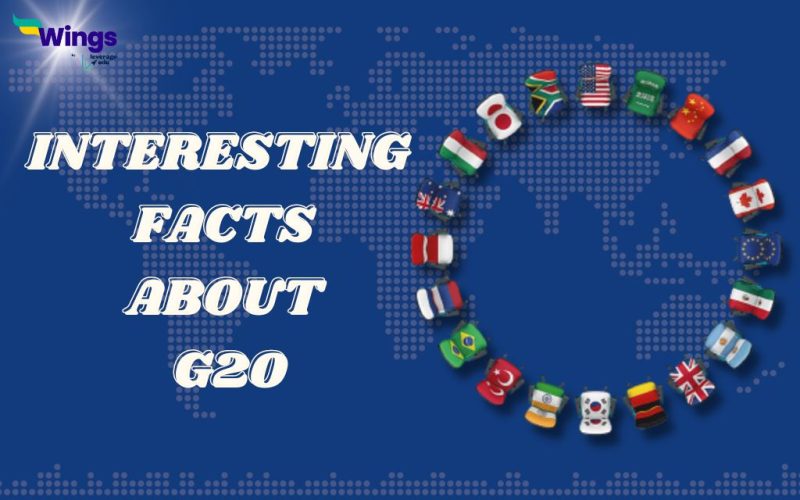Top 7 Interesting Facts about G20: The G20 was established in 1999 as a political platform for cooperation and discussion among the European Union and the top 19 industrialised and emerging market nations. The G20 discussions give the most influential leaders the chance to have informal conversations about topics pertaining to the global economy, reducing greenhouse gas emissions, and sustainable development. Check out this blog to know some of the interesting facts about G20.
This Blog Includes:
7 Interesting Facts and Figures About G20
Over the course of the years, many interesting happenings have taken place in and around the summit. Below mentioned are some of the interesting facts about the G20:
More than Just a Summit
The Group of Twenty (G20) is the most important platform for global economic cooperation. It plays a very pivotal role in shaping and enhancing global architecture and governance on all the major international issues. It consists of various working groups. The numerous working group meetings, expert conferences, and ministerial-level meetings are organised mostly by the country holding the G20 presidency.
Formed in Response to the Oudated G7 Group
The Group of Twenty (G20) was initially founded in 1999 in response to complaints that the Group of Seven (G7) was out of date and excessively restrictive. The G7 is an informal alliance of the seven most developed economies in the world, including Canada, France, Germany, Italy, Japan, the United Kingdom, and the United States.
Largest Informal Group
The top 20 industrialised and developing countries make up the G20 organisation. It accounts for more than 2/3rd of the world’s population, 75% of global trade and around 85% of the world’s GNP which makes it the largest informal group in the world.
The G20 represents 80% of the global GDP. Brazil, Russia, India, China, and South Africa (BRICS) account for 31% of global production, followed by the European Union (17%), the United States (16%), and the other G20 nations (also with 16%). Additionally, the G20 countries account for more than 75 per cent of global trade. The G20 nations exported 77.5% of the goods and services to other countries in 2015. In the same year, the G20 received 76.5% of all imported products and services. In terms of trade, China and the United States led all other countries in 2015. With relation to both imports and exports, Germany comes in third place.
Pillars of G20’s Work
There are two tracks for the G20’s work leading up to the summit: the Finance Track and the Sherpa Track. There are working groups within the two tracks that are thematically focused where representatives from the pertinent ministries of the member and host countries as well as from the involved international organisations meet.
Every working group has a co-chair from an industrialised and an emerging market nation, and meetings take place regularly throughout the tenure of each presidency. Both tracks additionally feature ministerial meetings that culminate in joint ministerial pronouncements on sector-specific policies. The approach occasionally includes conferences on particular subjects. The findings are included in the summit’s final communiqué and serve as the foundation for talks there.
No Permanent Secretariat
Since it is an unofficial club of nations, the G20 does not have a secretariat that could guarantee the continuation of its activity. Instead, the nation in power is in charge of carrying out this mission, and it is assisted by the nations that have previously held the presidency and those that will take it in the future.
Flexible and Adaptable
The G20 is not founded on a legally binding international agreement with a clearly defined mandate. Instead, it is purposefully casual, making it flexible and adaptable. Procedures and membership are not subject to any explicit rules. Agreements can only be made by consensus and all member nations’ votes have equal weight.
The G20’s work does not produce legally enforceable conclusions; rather, it just enables the nations to specify their shared objectives, responsibilities, and guiding principles in their summit final declarations. The G20 depends on its member nations and the international bodies under its sphere of influence for its implementation.
Other Members of the Group
The G20 works with additional states and organisations in addition to its member nations. The International Monetary Fund (IMF), the World Bank, the United Nations (UN), the Organisation for Economic Co-operation and Development (OECD), the World Trade Organisation (WTO), the International Labour Organisation (ILO), and the Financial Stability Board (FSB), as well as the nations in charge of the regional organisations ASEAN, the African Union, and the development initiative NEPAD, are regular participants in the G20 process.
The G20 includes Spain as a “permanent guest”. Other nations and institutions may be invited by the nation currently in the presidency.
Related Articles:
How Does G20Affects Foreign Policy of Participating Countries
Top 5 G20 Countries For Sports Management Courses
For more such updates about the G20 and Y20 Summit stay tuned to our page. And don’t forget to follow us on Instagram, Facebook, Twitter, and Linkedin.


 One app for all your study abroad needs
One app for all your study abroad needs












 60,000+ students trusted us with their dreams. Take the first step today!
60,000+ students trusted us with their dreams. Take the first step today!